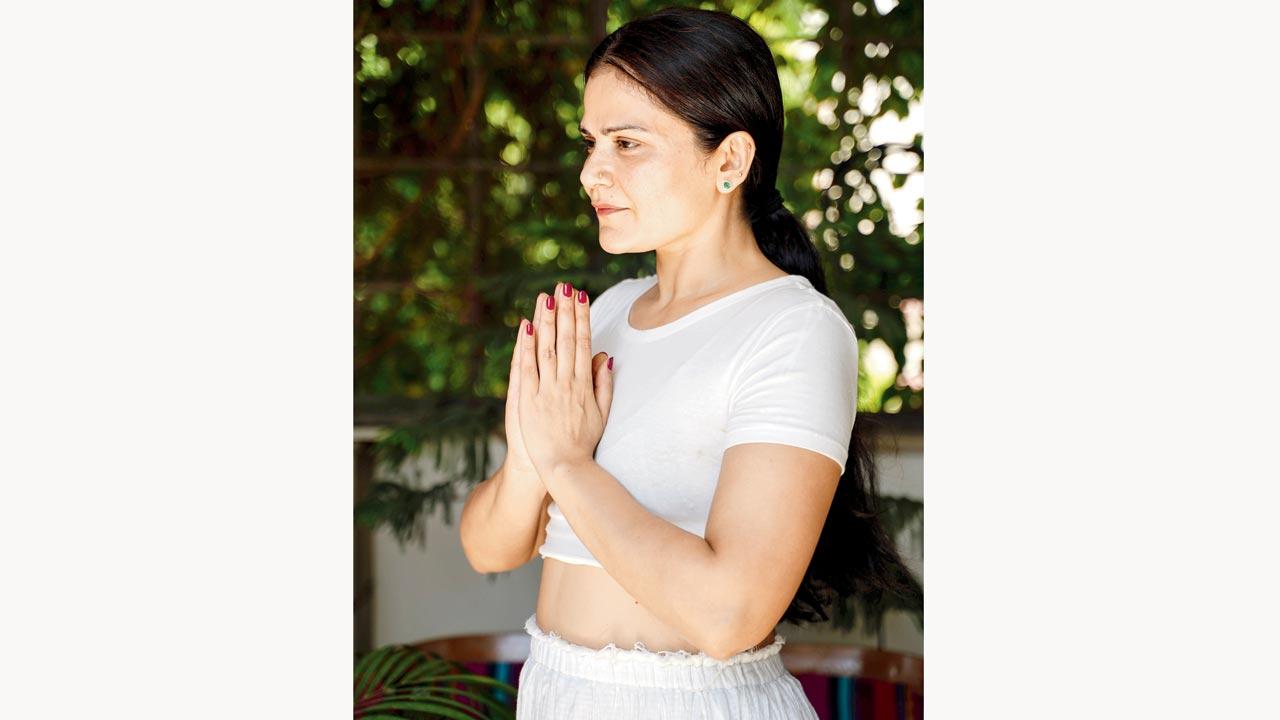A wellness influencer’s new book dwells on daily kriyas that impact the way we wake up, eat, sleep, breathe and most importantly, rise above the chaos that’s beyond our control

Vasudha Rai’s book discusses various forms of self-care rituals—massages, navel oiling, sound healing, mealtime protocols, breathwork, exercise regimen, herbal concoctions—that place relaxation as a goal in itself. Pics/Nishad Alam
![]() Why We Sleep, the popular book written by neuroscientist Mathew Walker, is Vasudha Rai’s bedtime companion. It also became a defining reference text when she was writing and researching her new book, Ritual (Penguin Random House). Rai elaborates on Walker’s thesis—humans are the only species who forcefully keep themselves awake—and advocates strongly for bedtime hygiene. As she mentions “for no good reason, we always delay sleep”, one is reminded of the crime dramas, court intrigues and family feuds on OTT platforms, which have kept people awake in the post-pandemic world. We know how difficult it is to execute a lights-off policy in a household, when a “reel” or a WhatsApp forward or an online reunion doesn’t fail to push people in a vortex of stimulation before going to bed.
Why We Sleep, the popular book written by neuroscientist Mathew Walker, is Vasudha Rai’s bedtime companion. It also became a defining reference text when she was writing and researching her new book, Ritual (Penguin Random House). Rai elaborates on Walker’s thesis—humans are the only species who forcefully keep themselves awake—and advocates strongly for bedtime hygiene. As she mentions “for no good reason, we always delay sleep”, one is reminded of the crime dramas, court intrigues and family feuds on OTT platforms, which have kept people awake in the post-pandemic world. We know how difficult it is to execute a lights-off policy in a household, when a “reel” or a WhatsApp forward or an online reunion doesn’t fail to push people in a vortex of stimulation before going to bed.
ADVERTISEMENT
Rai’s book makes a passionate case for treating sleep as nutrition, a supreme immunity booster, an anti-ageing pill and a memory enhancer. In jest, she says we need to prep up for sleep, as we do while planning a vacation. Sleep, not diet and exercise, is the main pillar of good health that we all seek, but refuse to submit to daily rites, which harmonise the natural energies of the night. Rai’s book urges readers to find the inner motivation to execute daily kriyas, which help in winding down as per the circadian rhythms. She shares her own routine—off-smartphone, off-caffeine, off-social media, in a world of light reading, gentle musical notes, journaling, and guided meditation—so as to inculcate the importance of a routine, any chosen routine, to purposefully (not reluctantly) end the wakeful hours. For those suffering from a sleep disorder—there are 80 known types—a somnologist’s appointment should be priority number one, Rai says, adding that sleep duration, posture, quality are make-or-break aspects.

But Ritual, which is Rai’s second book—first was Glow: Indian Foods, Recipes and Rituals For Beauty, Inside Out—is not all about statutory warnings and “reader beware” listings. Rai, a yoga instructor, wellness writer and podcaster on holistic healing, meticulously creates a repository of doable daily practices, which can enhance our focus and productivity. She cites several popular and alternative medicine protocols, restorative practices (yoga to traditional Chinese medicine), modern living fundas, to bring home the worth of short-time methods, which result in lifetime gains.
The book is divided into two parts: the Sun and the Moon. The latter opens with an ode to the night, which offers limitless possibilities of rest, healing, rejuvenation and nurture. Rai populates this section with various forms of self-care rituals—massages, navel oiling, sound healing, mealtime protocols, breathwork, exercise regimen, herbal concoctions—which place relaxation as a goal in itself. Likewise, the book’s other half is a celebration of the Day suffused with solar energy. Rai guides the reader, literally, from the first wake up moment. No rash-sounding alarms please, but gentler induction into a relaxed and anxiety-free morning, she advises. With the aid of tabulated factoids and line drawings, she recommends a purification routine, inward and outward cleanse. She has an elaborate listing of daytime elixirs, which aid digestion. Similarly, she suggests afternoon booster exercises and brain-boosting infusions to keep an alert mind—brahmi, mulethi, mint and aparajita.
What is commendable is that Ritual presents Rai’s prism, but leaves room for all views. Rai, 41, a beauty expert, has lived all over India, being born in an army officer’s family. As the extended family was also in the armed forces, discipline and a routine-based lifestyle was inculcated much earlier in life. Even today her brother runs marathons and does ashtanga yoga. “My father used to be a boxer and plays golf every day, my mother walks eight kilometres daily. So everyone is attached—sometimes overly so—to their own routines,” maintains Rai, who graduated in fine arts from Delhi, after which she applied for a beauty writer’s position in a magazine. She was inducted into the job, which paved the way for a full-fledged career that vibed well with her interest in wellness. Her book is a testament to her updated knowledge of restorative practices. She quotes varied sources—nutrition researcher Paul Pitchford to Charaka Samhita’s famed theories of diet and hygiene—and weighs her view in a holistic global context. She shares her vulnerabilities, too. For instance, her formula to counter a sleepless night is to pick on a heavy academic tome. Her effort to digest the book’s constructs in a super wakeful state ensures sleep. In the purification/detoxification morning regimen, she recommends a pre-bath massage, which grounds the mind. However, she hastens to add that modern-day pressures only allow quicker, less elaborate fuss-free cleansing. Therefore, one can tweak around rituals as per personal priorities.
In these shaky times, when people generally are looking for emotional support, fitness/wellness experts often double up as counsellors or healers or therapists. The dividing line between the physical fitness instructor and the spiritual guide is fading with every passing day. In that context, Rai’s Ritual steers away from a moral science class. In fact, Rai mentions her own fascination with multiple spiritual practices, and doesn’t pit the adherence of one against the other. She expresses her dislike for “spiritual shopping” and advises that people can sample several meditative practices/techniques which help the brain to feel centred, calm and energised. While curiosity will lead people to newer practices, it should not result in random short-term choices. Each of us have to judge for ourselves as to what suits best in creating fresh neural pathways in the brain.
Rai lives in New Delhi, Gurgaon to be specific. The city has the highest exposure to toxic air in the country. While India had the fifth highest annual recordings of fine particulate matter (PM2.5), the year-round average for PM2.5 pollution in New Delhi is the worst record associated with any capital city in the world. Does that demoralise Rai whose recommendations of daily rituals, especially breathwork and morning mudras/asanas, are directly correlated with city air quality. Rai says: “I try not to get too mentally stressed about it and I take care of myself as much as possible, wearing masks, using air purifiers, eating antioxidant rich foods, working out, and sleeping on time. But most importantly, these days I’m trying to work on being less reactive, more calm.”
Rai feels habit building is the name of the game. If there’s only one healthy habit that one should practice, it is to live according to circadian rhythms (physical, mental, and behavioural changes that follow a 24-hour cycle). Science has proved that just doing this much helps the body function at the most optimal level, she maintains. For this habit to become behaviour, everyday motivation is the saviour.
Sumedha Raikar-Mhatre is a culture columnist in search of the sub-text. You can reach her at sumedha.raikar@mid-day.com
Did you know?
. Physiological sighs (two inhales through the nose and a long exhale through the mouth) help in offloading tension
. Yoghurt works as a cleanser and face mask. Rich in probiotics, lactic acids and emollients, it calms the skin
. Making friends with your breath is part of knowing yourself, before going out into the world to seek knowledge. Set a timer for two to five minutes, lie down in bed, and focus on your breath. Deep, shallow, warm, cool—understand your breath, trace its movements
. You are as young as your spine, which is why you should know if your posture is erect
 Subscribe today by clicking the link and stay updated with the latest news!" Click here!
Subscribe today by clicking the link and stay updated with the latest news!" Click here!







